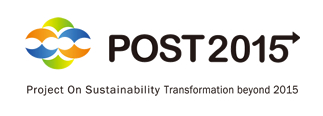The UN University Institute for the Advanced Study of Sustainability (UNU-IAS), Tokyo Institute of Technology, and the POST2015 Project held a policy forum on questions related to the architecture and implementation of the Sustainable Development Goals (SDGs).
Three policy briefs were presented at the event, which was sponsored by Japan's Ministry of the Environment.
 22 May 2014: The UN University Institute for the Advanced Study of Sustainability (UNU-IAS), Tokyo Institute of Technology, and the POST2015 Project organized a policy forum on questions related to the architecture and implementation of the Sustainable Development Goals (SDGs). Three policy briefs were presented at the event, which was sponsored by Japan’s Ministry of the Environment.
22 May 2014: The UN University Institute for the Advanced Study of Sustainability (UNU-IAS), Tokyo Institute of Technology, and the POST2015 Project organized a policy forum on questions related to the architecture and implementation of the Sustainable Development Goals (SDGs). Three policy briefs were presented at the event, which was sponsored by Japan’s Ministry of the Environment.
The policy brief on ‘Earth System Challenges and A Multi-layered Approach for the Sustainable Development Goals,’ presented by Norichika Kanie (UNU-IAS and Tokyo Institute of Technology), argues that human actions are drawing down the planet’s natural capital in an unsustainable manner, and that the SDGs must address the challenge of redirecting unsustainable practices. It proposes framing targets in global terms but tailored at regional, national, local or corporate/organizational levels, and allowing actors to select the options best suited for them. It also suggests that a performance review system, such as the Global Sustainable Development Report, comparable reporting mechanisms at the national level, and roles for actors beyond national states, will be essential.
The policy brief on ‘Linking Education and Water in the Sustainable Development Goals,’ presented by Yuto Kitamura (University of Tokyo), cites the need for “water literacy” among people worldwide, in order to respond to water-related sustainability challenges. To this end, government representatives and other stakeholders should require an accurate understanding of water-related issues, and establish systems to implement concrete measures. The authors identify the nexus of water and education as offering opportunities to address inequity in education, disaster recovery and local mobilization.
The policy brief on ‘Integrating Governance into the Sustainable Development Goals’, presented by Casey Stevens (UNU-IAS), finds that three aspects of governance need to be integrated into the SDGs: good governance (the process of decision-making and their institutional foundations), effective governance (the capacity of countries to pursue sustainable development); and equitable governance (distributive outcomes). These three require separate political efforts. The authors also say that a stand-alone SDG on governance would offer the best opportunity to comprehensively incorporate all three aspects, but a risk remains of privileging good governance over effective or equitable governance.
The Policy Forum on ‘Governance,’ ‘Education’ and the Architecture of the SDGs took place on 22 May 2014, at UN Headquarters in New York, US. The event was moderated by Pam Chasek, IISD Reporting Services and Manhattan College. Laszlo Pinter, Central European University and IISD, served as Commentator. [Policy Briefs] [Event Information]